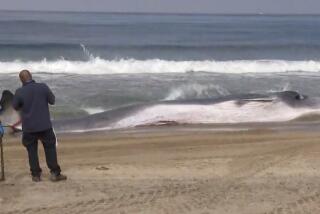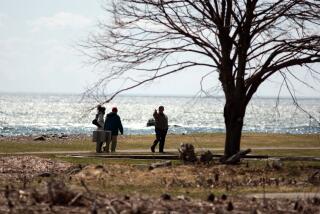No Happy Ending for London’s Fantastic Whale Tale
- Share via
LONDON — After a delicate rescue by anxious humans, the whale that swam into London and into the hearts of people around the world convulsed and died Saturday night as a barge carrying it toward the sea was almost within sight of open water.
Dejected rescuers who had hoped to pull off a miracle hugged one another in consolation as the barge belonging to the Port of London Authority turned slowly around and brought the northern bottle-nosed whale back to a Kent quayside.
It was lifted onto a pier, still wrapped in the damp blankets that covered it during the rescue, and officials said it would be studied by scientists to determine what might have caused its sensational journey and its subsequent death.
“It was a valiant attempt and they did their best,” said Laila Sadler of the Royal Society for the Prevention of Cruelty to Animals, as the loss sunk in for her and others who had been riveted by the plight of the whale.
Adapted to life in the deep waters of the North Atlantic, the young male whale had wandered 40 miles upriver to the center of one of the largest metropolises of the Western world. No whale had ever been recorded so far upriver in England.
Arriving Friday morning, the 18-foot whale, weighing an estimated 6 tons, swam between Chelsea and Greenwich for more than 24 hours. It attracted thousands of spectators as it passed by such landmarks as the Houses of Parliament and Tower Bridge.
Rescuers lost track of the whale overnight, but when it again became stranded in shallow water late Saturday they were able to reach it, examine it and make the decision to try to move it to the sea.
Most of the work was carried out by volunteers of the British Divers Marine Life Rescue charity, assisted by police, firefighters and port personnel. The trained volunteers approached the whale by wading into the river at low tide, lifting its belly off the river bottom using pontoons, and guiding it between two rigid inflatable boats to the barge.
Thousands of people watched from the city’s riverbanks and bridges, some waving and cheering as the whale passed eastward to the sea. But experts had cautioned that the animal probably was ill and had only a slight chance of surviving.
“From the outset we always knew we were up against it and the odds were slim,” Dr. Paul Jepson, the veterinary surgeon in charge of the operation, said in a statement.
He said the rescuers had already decided to euthanize the animal aboard the barge as they were nearing the mouth of the Thames. But before that happened, the whale went into convulsions and died about 7 p.m., eight hours after the rescue had begun.
The veterinarian, who heads Britain’s Marine Mammal Stranding Project, added that he hoped the memory of the whale’s visit would inspire young people who had seen the behemoth to become marine enthusiasts and conservationists in the future.
Tony Woodley, spokesman for the British Divers Marine Life Rescue charity, said it had been overwhelmed by the outpouring of support and sympathy from as far away as Australia, South Africa, the United States and Israel.
The group’s website, which normally receives 1,000 hits a day, had been inundated with 45,000 Saturday, he said.
“Everybody seems to have an interest in large marine mammals, especially in this alien environment,” Woodley said. “Everyone wanted to do the best for it, and unfortunately it was a race against time that was lost.”
More to Read
Sign up for Essential California
The most important California stories and recommendations in your inbox every morning.
You may occasionally receive promotional content from the Los Angeles Times.










